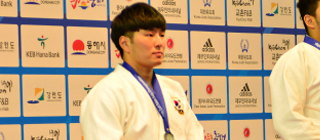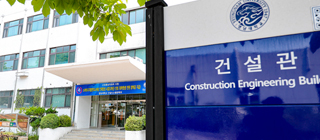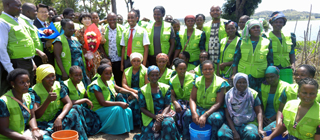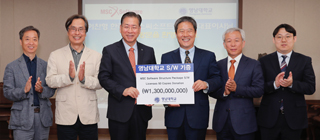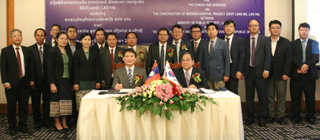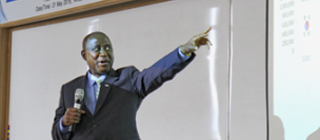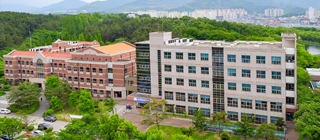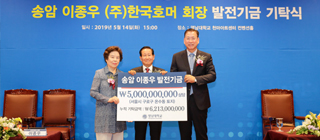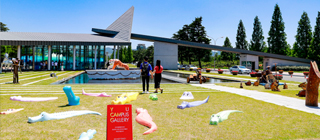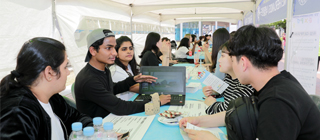-
-
Department of Civil Engineering to receive national funding for up to 5 years and all graduate school students to receive scholarships Joined by 5 universities including SNU and KAIST, and the only university selected in the Daegu and Gyeongbuk regions Expected to construct infrastructure and curriculum for fostering experts in plant and construction engineering [June 18, 2019] YU was selected for the ‘2019 Industry Expert Empowerment Project’ hosted jointly by the Ministry of Trade, Industry and Energy and the Korea Institute for Advancement of Technology. The YU Department of Civil Engineering was selected in the ‘Smart Digital Engineering Expert Fostering Project’ and will take part in the project by receiving national funding from the government for up to 5 years from this year until 2024. The ‘industrial expert empowerment project’ is for specialized educational courses of graduate school or higher and it aims at fostering industrial experts in various fields that will lead the future industries. The project will last for 4-5 years depending on the project, and this year’s government budget is approximately 2.7 billion KRW. The ‘Smart Digital Engineering Expert Fostering Project’ will be joined by five universities including YU, Seoul National University KAIST, Myongji University and Inha University. In particular, the YU Department of Civil Engineering was the only department in the Daegu and Gyeongbuk region to be selected for this project. The project will last for five years from 2019 to 204, and after evaluation in the third year, a decision will be made on whether or not to continue support. With the selection for this project, the YU Department of Civil Engineering is expected to construct world-class expert network and personnel fostering infrastructure to cultivate global leading engineers in the plant and construction engineering sectors, and will be equipped with systematic educational curricula. In particular, graduate school students participating in the project will receive full scholarships during the term of the project.
-
Graduates from Tanzania, Kenya and Uganda become ‘Saemaul Leaders’ back home Providing support for Saemaul departments at local universities and looking to establish YU Africa alumni associations [June 3, 2019] YU (President Sur Gil-soo) is sowing seeds of hope in the African continent that they too can be economically affluent like Korea. The field they are sowing the seeds in are Tanzania that surround the second largest lake in the world, Lake Victoria. The stewards of the field are alumni from these three nations who graduated from the YU Park Chung Hee School of Policy and Saemaul. The YU Park Chung Hee School of Policy and Saemaul graduated 29 master’s degree holders in Saemaul sciences for the first time in the world in August 2013, and since then, a total of 530 students from 61 countries around the world graduated. Among them, 191 were from 24 countries in Africa, with 25 from Tanzania, 10 from Kenya and 20 from Uganda for a total of 55 YU Park Chung Hee School master’s degree holders from the African nations surrounding Lake Victoria. The reason why these people who mostly were already political and social leaders in their countries before setting off for studies in Korea was because they had the goal of contributing to the economic development of their home countries. And they are now filled with hope that they may finally achieve their goals. YU External Affairs Office Director Heo Chang-deok visited this field of hope in late May. They first visited Sengerema District, Mwanza Region, Tanzania. What stood out the most was the Saemul Undong flag and sign. Former Mayor of Sengerama Mathew N. Lubongeja (54), who returned home after earning his master’s degree in Saemaul studies in February 2018, organized a Saemaul women’s association and transformed 1.5 hectares (15,000m2) of abandoned land near Lake Victoria into farmland for cassava, pineapples, cashew nuts, and corn. They did not have proper irrigation facilities such as pumps and had to fetch water from Lake Victoria with buckets to farm, the faces of the residents who welcomed Mr. Heo were filled with hope. These people were convinced that they would soon have bigger land to farm and would be able to send their children to school, and they welcomed Mr. Heo and the other visitors with a song that they added ‘Saemaul Undong’ lyrics to an African folk song. The next destination was a small rural village about 2 hours by car from Entebbe, Uganda. Again, Saemaul Undong flags and signs welcomed Director Heo and his team at the village that they arrived in after traveling an unpaved and narrow uphill road. Residents wearing Saemaul Undong vests thanked the visitors saying that the overall income of the town increased significantly after learning the Saemaul Undong to raise cattle, take milk, and grow pineapples and flowers. YU External Affairs Office Director Heo Chang-deok (Department of Sociology, 53) who was welcomed passionately by the residents said, “I once again truly feel that Korea’s Saemaul Undong is developing into the world’s Saemaul Undong,” and added, “We should not stop the Saemaul Undong until everyone in the world can live prosperously together. YU will also take research and education more seriously to train global leaders of the Saemaul Undong.” As part of such efforts, YU is looking to export the Department of Saemaul Studies to Africa following the Philippines and Cambodia. For this, YU signed an MOU with Sokoine University of Agriculture, which is a national university located in Morogoro, Tanzania during this visit. Sokoine University President Paphael T. Chibunda said, “I believe that the most important success factor of the Saemaul Undong was instilling confidence that we too can become rich like Korea. Our university will therefore fulfill our role to change the hearts and attitude of our citizens through education.” Also, one graduate who is an attorney-slash-presidential policy advisor in Tanzania created a Saemaul Undong NGO by receiving official approval from the Tanzanian government. During Mr. Heo’s tour, he visited the lodge to reveal his plans to establish a YU Africa alumni association, shedding the light of hope to the dark continent through the activities of African graduates of Saemaul Undong at YU. Meanwhile, YU has been engaged in Saemaul ODA projects such as building an elementary school at Illemela in Mwanza, Tanzania together with the city of Daegu. The city of Illemela officially established the ‘Saemaul Department‘ to oversee this and the Saemaul Department director also received Saemaul training at the YU International Development Cooperation Center.
-
YU College of Mechanical and IT Engineering – to be used for designing various mechanical structures such as automobilesFostering outstanding personnel to meet industrial site demands by using professional software [June 3, 2019] Korea MSC Software CEO Lee Chan-hyung donated software worth 1.3 billion KRW to YU. At 10:30 a.m. on May 30, Korea MSC Software CEO Lee Chan-hyung visited YU and met with YU President Sur Gil-soo to donate software worth 1.3 billion KRW to contribute to the improvement of practical modeling abilities of students of the Department of Automotive Engineering. The MSC Structure Bundle Package that was donated is a professional program used for analyzing and designing various automobile parts and mechanical instruments. Korea MSC Software is planning to install a total of 50 copies at the YU Automobile Hall to help cultivate outstanding mechanical IT personnel and is planning to provide program upgrades and technical support for three years. Mr. Lee said, “Korea MSC Software is a company that offers practical solutions to convert corporate smart factories. The donated MSC Structure Bundle Package is a professional program to be used for design work for the overall industry,” and added, “We decided to donate this software to help students of the YU College of Mechanical and IT Engineering improve their design skills.” YU President responded by saying, “I would like to thank this global software company for donating this expensive software to help foster outstanding human resources at our university.” He added, “We will do our best to utilize the donated program to foster outstanding experts.” Meanwhile, YU separated the electric, electronic, computer, information communication and mechanical majors from the College of Engineering in 2017 to establish the College of Mechanical and IT Engineering and to newly open the Department of Automotive Engineering and Department of Robotics and Intelligent Machine Engineering. YU is currently focusing on fostering the mechanical, electric, electronic and computer engineering fields, which YU has traditionally been a powerhouse in, as well as future growth engine sectors such as future automobiles and intelligent robotics through the College of Mechanical and IT Engineering.
-
Signed contract and held ceremony for the ‘Laos Ministry of Public Safety Modern Hospital Construction Project’ [June 4, 2019] The YU Medical Center (Director Kim Tae-nyeon) announced that it had entered an agreement for the modern hospital construction project with the Ministry of Public Security of Laos on May 30. At this event were present Medical Center Director Kim Tae-nyeon, Planning and Adjustment Office Director Song Shi-yeon and Project Supervisor Lee Gyeong-soo (Preventive Medicine Class Professor) This project is on constructing the Laos Ministry of Public Security Hospital and it is being conducted under the supervision of the YU Medical Center with a budget of 65 million USD (app. 75 billion KRW). YU Medical Center signed an MOU for Laos health and medical system improvement cooperation and Laos national medical center construction projects in December 2010 and this year, it entered an agreement for the Ministry of Public Security modern hospital construction for Laos. At the signing ceremony were present YU Medical Center, the supervisor of the Vientiane, Laos project, Gansam Construction, HM&Company, AMIS Technology, Daeyeong Ubitec, and the Laos Ministry of Public Security. The agreement included contents on cooperation to construct a modern hospital for the development of the health and medical industry of Laos and to enhance mutual trust between the parties. Currently, Laos has limited medical service supply and so many patients are receiving treatment at a nearby national hospital. Therefore, demand for high quality medical services and the construction of medical infrastructure is continuously rising. Director Kim Tae-nyeon said, “We will do our best in the construction of the hospital with the thought that the Laos Ministry of Public Security modern hospital will be a hospital that our family members will receive treatment,” and added, “We will work on making this project a model example for our medical center to export the advanced medical systems of Korea.” Following this, the project supervisor, Professor Lee Gyeong-soo gave a briefing on the operation plans and direction for medical services related to the modern hospital construction for the Ministry of Public Security. Professor Lee said, “Through this project, we hope to create a medical system that can ensure systematic medical services to the citizens of Laos.” Meanwhile, the YU Medical Center has continued relations with Laos for 10 years to improve the friendly cooperative relationship between Korea and Laos and to make improvements to the health and medical sector of Laos. The ‘Laos Ministry of Public Security Modern Hospital Construction Project’, which is an ODA (official development assistance (ODA) project supported by the EDCF (Economic Development Cooperation Fund in April 2019, selected the YU Medical Center as a consultant to further solidify cooperative relations. Moreover, this is the first time that a medical institute from the Daegu-Gyeongbuk region will participate as a supervisor for an overseas general hospital construction project, and because such case is rare for medical institutes in the Seoul area as well, many medical institutes are paying close attention to this project.
-
Theme was ‘diplomatic role for the sustainable development of Africa’ Inviting ambassadors of various countries to Korea to share development experience of international development cooperation [June 5, 2019] Sierra Leonean Ambassador to Korea H.E. Kathos Jibao Mattai gave a special lecture at YU. This special lecture that was held at the YU Cheonma Art Center Grand Hall Room 307 at 2 p.m. on May 31 was attended by over 70 international students studying at the Park Chung School of Policy and Saemaul. One student from Sierra Leone graduated from the YU Park Chung Hee School so far, and there is currently one student from Sierra Leone currently. This special lecture lasted for about 120 minutes under the theme ‘Diplomatic Roles for Sustainable Development of Africa (focusing on the case Sierra Leone)’. Ambassador Kathos Jibao Mattai spoke about policy directions for attaining the UN’s sustainable development goals (SDGs) and diplomatic roles such as cooperation of neighboring countries needed during that process. In addition, Ambassador Kathos Jibao Mattai met with YU President Sur Gil-soo, Park Chung Hee School of Policy and Saemaul Dean Kim Gi-soo, Global Saemaul Development Network (GSDN) Chairman Choi Wae-chul (Saemaul and International Development Professor) to discuss ways to share the academic system of the Saemaul Undong and international development accumulated by YU and on mutual cooperation methods. Last year, Rwandan Ambassador to Korea Emma Isumbingabo and Zambian Ambassador to Korea Wylbur Chisiya SIMUUSA also spoke at YU. Ambassadors from various nations to Korea are visiting YU to share their policies and exchange opinions on Saemaul international development with international students at the Park Chung Hee School one after the other. YU Park Chung Hee School of Policy and Saemaul Dean Kim Gi-soo explained, “For students who will work as international development and regional development experts after graduating, sharing development policies and examples pursued by different nations will be very important.” He added, “Listening to lectures by leaders of diplomatic envoys who are sent to various countries and engage in international cooperation work and make policy decisions will be a valuable asset for them.” Meanwhile, the YU Park Chung Hee School of Policy and Saemaul is inviting various ambassadors to Korea to hold special lectures on official development assistance (ODA), international development cooperation, and development experiences to share the international development cases of various countries.
-
Eighth class for law school ranked second following Seoul National University Passing rate since opening the law school 87.78%, first among non-Seoul universities Master’s degree rate compared to total admitted students first in the nation... Proven to foster high quality lawyers [May 21, 2019] YU (President Sur Gil-soo) once again proved that it is a cradle for fostering lawyers by ranking second place for passing rates compared to the admitted students for the 8th class following only Seoul National University. The Ministry of Justice announced the passers of the 8th Bar Exam on May 1. According to this, a total of 3,330 people applied and 1,691 people passed the exam for a passing rate of 50.78%. Upon analyzing the ‘passing rate compared to actual admitted students for each grade’, which is recognized as the most objective standard in the jurisprudence, legal circles, and test-takers, in the 8th exam passing rate, Seoul National University recorded 75.97% followed by the YU Law School at 70.00%, proving that YU has become established as a prestigious law school of Korea by placing second place. In addition, YU took first place among non-Seoul universities for the cumulative passing rate for the 1st to 8th bar exams at 87.78%. It was confirmed that since the opening of the law school, it continued to maintain high passing rates. Also, according to the data provided by the Ministry of Justice, the YU Law School took first place in the nation for the rate of earning master’s degrees compared to actually admitted students at 93.59% (577 total students admitted / 540 earned degrees). This demonstrates that YU not only made the achievement of fostering lawyers by passing bar exams, but also in cultivating human resources specializing in jurisprudence through the substantiality of law school education. In the case of passing rate compared to total test-takers in the 8th bar exam, YU, Seoul National University, Korea University, Yonsei University, Sungkyunkwan University, Sogang University, Kyunghee University, Ewha Womans University, Hanyang University, and the Hankuk University of Foreign Studies were placed in the national top 10 in passing rates. YU Law School is the only school located outside of Seoul among the top 10 universities. Among non-Seoul universities, YU Law School took first place (61.17%), followed by Pusan National University (49.12%) at second place and Kyungpook National University (45.45%) at third place. The secret to the success of the YU Law School is in the student-oriented operation principles such as education, research administration services, etc. The academic growth and student guidance program accumulated since the opening of the law school has become an unrivaled program incomparable to that of other law schools. To be more detailed, advisors offer comments on the results of practice tests taken by students and hold group studies or individual lessons with students two to three times a week to enhance the concentration of students. In particular, the overall capacities of students at the law school were upgraded through education focusing on case problem-solving and 1 on 1 correction guidance programs for under-performing students. Furthermore, its exceptional scholarship support and excellent faculty are already well known. Full-time professors often turn in their vacation to offer special lectures or provide assistance in group studies, while professors who were formally judges, prosecutors and attorneys for students who wish to become law clerks or prosecutors. Also, adjunct professors who are currently working in the legal field also help with practical education. Furthermore, the school also actively manages the concerns and stress of students aside from academic support. There is a specialized researcher exclusively for law school students at the student support center, and they provide consultation for student concerns and search for solutions. It also improved the study areas to remove the smallest discomforts for students studying, 24 hour study halls, lounges, sleeping rooms, kitchens, shower rooms, and other convenience facilities for students. YU Law School Dean Lee Dong-hyung said, “YU Law School has constructed an optimal system to help students study effectively.” He added, “Based on the full support by the school, the passionate lectures of outstanding faculty, self-initiated learning among students, and the systematic administrative support made it possible to achieve such good results.” YU President Sur Gil-soo said, “Objective indicators proved that the YU Law School is one of the top law schools,” and added, “YU Law School is also maintaining top rankings in indicators that show the qualitative excellence of the law school education such as master’s degree acquisition rates. The university will provide full support to maintain the status as a prestigious law school.”
-
Donated a total of 6.2 Billion KRW by operating the ‘Songam Scholarship Foundation’ for alma mater and juniors since 2002 Donations to be used as renovation funds for the science library to help foster science and engineering students Graduates who received the Songam Scholarship also joined in the efforts and donated 10 million KRW [May 14, 2019] <Life is determined not on how much one gathers, but how much is shared - Aired on YTN News on May 14, 2019> “I am practicing sharing for my alma mater YU that made me who I am today and my juniors. I believe that sharing determines the true value of life.” A very special event was held at the YU Cheonma Art Center Convention Hall at 3 p.m. on May 14. Korea Former Chairman Lee Jong-woo (80) from the YU Department of Mechanical Engineering ‘64 donated 5 billion KRW worth of real estate for the renovation of the YU science library. He decided to donate a huge sum to pay for the renovation expenses after seeing difficulties with renovating the science library. Aside from the 5 billion KRW that Chairman Lee donated, he donated over 1.2 billion KRW to YU as scholarship funds to be used for students having financial difficulties like he did in the past since 2002 by establishing the ‘Songam Scholarship Foundation’. Since 2003, new sophomores in the School of Mechanical Engineering are selected every year to receive full scholarships until graduation. There are over 17 students that received the scholarships as of now. When including this donation, he made cumulative donations of 6.2 trillion KRW. The philosophy of Mr. Lee who made a huge donation is setting an example. He is famous to be very frugal when using money for himself or his family. He said that he never wanted to ride in a car driven by a driver and he practiced being frugal by driving his own car or taking the subway to commute. Mr. Lee said, “All I need is just the amount that I have to have to live.” He added, “I hope that the newly changed science library will be a cradle for my juniors to realize their dreams.” Mr. Lee was born in Japan in 1938 and returned to Gimcheon, Gyeongbuk in 1945 after the liberation of Korea, but then experienced the Korean War where he lived a tough and poor childhood. He did not receive official education, but had an undying thirst to learn. Thus, after being discharged from the Air Force and working as a civilian military employee, he decided to enroll at the YU Department of Mechanical Engineering in 1964 at the age of 27. He woke up in the morning and prepared two meals. He would eat his lunch at the military base and dinner at school and finally graduated after four years. Then, in 1977, Mr. Lee founded Korea Former, a lightweight steel frame and partition materials production company. Mr. Lee engaged in research and technological development with the spirit of ‘I may fail, but I will never give up’ and he introduced new technologies to Korea to help lead localization of agricultural materials and the development of the construction materials industry. In particular, graduates of YU who received the Songam scholarship fund also donated 10 million KRW in scholarship funds for their juniors to practice the philosophy of sharing that they learned from Chairman Lee. They practiced a culture of donation by passing on scholarships they received from their senior to their juniors. Lee Gi-beom (32), who attended the event on behalf of the Songam scholarship students said, “We are what we are today thanks to the scholarship of Chairman Lee,” and added, “We learned from Mr. Lee’s generosity and though it is only a small amount, we are proud to be able to donate to the scholarship fund for our juniors as well.” YU President Sur Gil-soo said in his welcoming address, “I would like to express my deepest gratitude to Chairman Lee, who is usually very thrifty and frugal, for his beautiful donation that made it possible to solve a big issue at the university.” He added, “The students will now be able to look toward a greater future through the renovation of the science library and we will do our best to become a university that fosters the best human resources that can contribute to the development of Korea.” Meanwhile, YU is planning to begin renovation construction of the science library using the funds donated by Chairman Lee combined with school funds so that science and engineering students can concentrate on their studies in a more excellent environment.
-
YU School of Fine Arts Trans Art majors in third project since 2016 Various sculptures made by Facility Management Office employees also exhibited for the college festival [May 24, 2019] Various sculptures placed around the YU (President Sur Gil-soo) campus captured the attention of students passing by. Students stopped to take a look at the various sculptures on campus at the main gate, Cheonma Art Center, and Mirror Pond. YU School of Fine Arts Trans Art major students made various artwork for the third year at the college festival since 2016. The YU campus was transformed into a massive art gallery during the college festival period. YU School of Fine Arts Trans Art Professor Shin Gi-woon that planned out the student exhibit said, “The students planned out this outdoor exhibit on campus so that other students on campus can pause while naturally appreciating artwork.” In particular, sculptures made by employees of the Facility Management Office using various recycled materials so that members of YU can enjoy art. Employees of the Facility Management Office that made sculptures for the first time said, “Our entire team worked together for three months, but it was not easy to make sculptures without having additional materials expenses.” He added, “I hope that everyone visiting our school during the Daedong Festival will be able to enjoy the festival while viewing the eco-friendly sculptures.” Meanwhile, the festival was highlighted with the ‘Run History’ tournament in commemoration of the 100 year anniversary of the March 1 Movement and the establishment of the Provisional Government of the Republic of Korea and the ‘Musical Campus’ hosted by the Cheonma Art Center to add meaning to the festival with various cultural events. YU President Sur Gil-soo said, “This year’s YU festival will showcase not only the works of trans art majors, but also the works made by faculty all around campus,” adding, “I hope that the college festival will be an opportunity for members of YU to spend time with the community.”
-
YU holds 4th ‘YU International EXPO’Introducing various internationalization programs such as exchange student, overseas employment and internship programsPractical information provided by former exchange students [May 16, 2019] YU (President Sur Gil-soo) held the ‘4th YU International EXPO’. This expo, which is held in May of every year since 2016 to strengthen the global competency of students, was held on the 15th and 16th attracting students passing the main gate of YU. This expo was organized to introduce and encourage participation in various internationalization programs such as overseas internships, overseas employment and overseas language courses, including overseas exchange student programs. The most popular program was the ‘Practical Information’ provided by students who had experience as exchange students at sister universities abroad and foreign exchange students from overseas sister schools. This year, 45 exchange students from 24 sister schools in 12 countries such as the US, Netherlands, Finland, France, Brazil, Chile, China and Japan and 19 students who went abroad as exchange students for a total of over 60 students came to the booths to share information with other students interested in going abroad as exchange students. Park Ji-min (19, School of Fine Arts, freshman) who said that one thing on her bucket list in college is to participate in exchange student programs. She said, “It was great to be able to learn information of various foreign universities and YU’s internationalization program information through this expo,” and added, “It was also very helpful to be able to talk to exchange students to learn about the educational program of the local university, intramural club activities, information about college life, as well as other information including safety.” The YU University Student Ambassador (USA) booth was also busy helping students during the expo. USA is a student organization that promotes the university internationally by using not only foreign language skills, but also a variety of other abilities, while also supporting international students at YU. This year, street recruitment was conducted to select the 18th USA and it stayed busy with applicants arriving throughout the expo. Furthermore, overseas internship agencies and the college job center also organized a booth to provide relevant information and give one-on-one consultation, thus showing all of the internationalization programs of YU through this expo. YU International Exchange Team Leader Lee Won-young who hosted this expo said, “The expo was designed to approach students who are interested in international exchange but don’t know how to participate.” He added, “The doors to the International Exchange Team are always opened so that more students will go beyond being simply interested, but also participate in the program and enhance their global capacities.” Meanwhile, as of the first semester of 2019, there are currently 157 exchange students from 47 sister schools from 22 countries around the world, and 159 YU students have been dispatched as exchange students to 54 sister schools in 19 countries.
